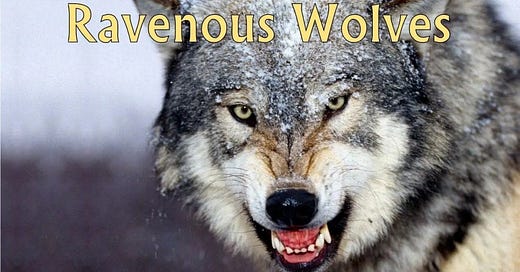Can you tell the difference between false teachers and true ones, especially since the false prophets are “in sheep’s clothing,” meaning that they look like sheep, like one of God’s people, but inwardly they are something else, a predator of God’s people. It’s important for you to be able to tell the difference.
For example, Charles Taze Russell, born in 1852 in Pennsylvania, raised a Presbyterian, then a Congregationalist, then became caught up in end-times speculations. He founded the Bible Student movement. You would assume that he was an earnest, well-meaning, searcher for God. A sheep. In his self-study, he concluded that the traditional doctrines of the Trinity, hell, and others, were not scriptural. He believed Jesus had been made divine – God – after dying on the cross. So, there was a time when He was not God. Russell also taught that the Holy Spirit is not a person, but a force. He founded the Jehovah’s Witnesses. Now you know, just with the name, a red flag goes up, they’re false prophets. But would you know if you lived around the year 1900 when people from the Bible student movement came up to you with copies of their Watchtower magazine?
Rob Bell was born in 1970, founded Mars Hill Bible Church in 1999 which quickly grew to over 6,000 people. You might think he looks like a genuine Christian teacher. In 2011, Bell released a book entitled Love Wins, arguing that we should be open to the idea that God’s love eventually wins all people, so that everyone is saved, no one is destroyed. John Piper responded with a simple, three-word post on twitter: “Farewell, Rob Bell.” But the “love wins” motto sounds so appealing, positive, even Christian, some think. Even here, in Danville, I saw bumper stickers released by a local church that said “love wins.” You think, who wants to oppose that? People couldn’t see anything wrong with it. Recently, according to a report, Bell is a selling two-day seminar, ironically called “discernment” sessions for $600 per person (not including room and food). Do you have the discernment to know what is wrong about that?
Jesus said, “Enter by the narrow gate” (Mt. 7:13.)
Two things that describe the road to destruction. First (1), “The gate is wide . . . that leads to destruction.” It’s designed for maximum traffic, to fit as many people as it can, like the 6,000 people who went to Rob Bell’s church. If you like the Mormon appeal, with the clean-cut look, family-values (even if you can’t have multiple wives any more), you can go the “Latter Day Saints” way. You want to go the Buddhist way where you say all the world is maya (illusion) and you should see that, be enlightened, and overcome your desires, you can do it. You want to go the materialists’ way where all you live for is money and all the things it can buy, and you strive to satisfy all your cravings, you can fit on the road too; there’s a lane for you. Or maybe you’ll go your own way. You’ll be the master of your fate, the captain of your soul. There’s a lane for you too. The way to destruction is diverse, with a lane for however you want to live, whatever you want to believe, whatever you want to do. It is broad enough to accommodate all the ways we might want to go.
Also, “The gate is . . . easy that leads to destruction.” The way to destruction has no demands; it requires no discipline; you don’t have to take up any cross or deny yourself anything. You can get to destruction by any way you choose. In fact, if it is just you choosing to go your own way, following your whims and will, you can be sure, you are going to destruction.
That is, the beginning is easy. A smooth, level, comfortable path with no curbs, no restrictions, no speed bumps or traffic laws. There’s lots of people going that way, enjoying the trip. And it begins easy. The road to the final destination let’s them take anything they want: they want to come in trusting in or their own morality and goodness. ‘Just be a decent person and you’ll be all right,’ the signs say on the way to destruction. The beginning is easy. But the end is hard.
“And those who enter by it – the gate to destruction – are many.” We might think destruction is only for a few – like being expelled from school or getting the death penalty: it’s a threat we hear about but very rarely does anyone get it. But here, Jesus says destruction is not rare. It’s common. Exactly opposite to our way of thinking today, the bandwagon effect, that if 90% of people are doing something, it must be good; if most people are eating that or wearing this, then I should too; if there’s a crowd somewhere, there must be something good or interesting there. If a lot of people are going to listen to that musician or band or watch that movie or play or performance or game, it must be good; the pastor with 6,000 church members must be good; the politicians always telling us that the polls show that they are leading because they know that people want to be where most other people are; contrary to all those assumption that the majority must be right, Jesus here tells us that one way we can tell the difference between the road to destruction and the road to life is that the road to destruction has a lot more traffic; it has the crowds; it’s popular.
Notice where all these crowds are going, contrary to Rob Bell: to destruction. That’s what the Greek word means: destruction, ruin, loss, perishing. It’s not just the the destruction of the stuff or the money or the thrills we lived for. It’s what we saw earlier this year in Thessalonians: the eternal destruction of ourselves; a destruction that goes on forever. That’s what Jesus teaches and one way we can tell true teachers from false is if they teach it too.
Another way to tell is that the false are ravenous. Instead of being sheep, false prophets are ravenous wolves.
The Lord Jesus tells us, “Beware of false prophets” (Mt. 7:15.) This doesn’t just apply to people who claim to be prophets. Very few do in our day. It doesn’t just apply to people standing up and saying, “Thus saith the Lord . . .” But it applies to anyone who teaches or leads, to have a revelation or truth that you should accept. False prophets are the missionaries who knock at your door, perhaps clean-cut looking boys in their late teens with a nice ironed white shirt, a sharp looking tie, and a name tag that says they are an “elder.” Or false prophets are those inviting you to Bible study with them, using their New World translation, and leaving you with a Watch Tower magazine. The fruit of their lives are deceived people, thinking they have to do the same kind of false prophesying in order to be saved. Or, a false prophet could be the secular professor at college who says that as long as you’re sincere, you’re okay; every truth is relative; it’s true if it’s true for you. The only false statement is the statement that there are false statements. Or a false prophet could be the sweet old lady that says that any behavior is fine except pointing out that some behavior is not fine. Or a false prophet could be a TV preacher using the Bible to tell you that you can use God to get rich, get everything you always wanted (if, of course, you remember to send your checks to him!). Or it could be the amiable friend who tells you he just wants to have a good time. That’s all. ‘Why be so hung up? Why stick to that narrow path?’ Or it could even be the respectable church member who the last thing he wants to hear is that he is a sinner who cannot please God by all his religion but has earned the eternal wrath of God, eternal destruction, if he does not trust that Jesus did for Him on the cross what he cannot do for himself.
How do you tell the difference between the false prophets and the true ones? Jesus says, they “come to you in sheep’s clothing — in disguise — but inwardly are ravenous wolves” (Mt 7:15.)
False prophets look like good people. They will come to you in the guise that you are most likely to accept, in a way that appeals to you. Perhaps you like the party-life. They’re probably waking up right now from a wild Saturday night, logging on to Facebook and inviting you to join them. Do you like the clean-cut conservative look? They’ll come right to your door!
Here they are wolves in sheep’s clothing. In other words, they look harmless; like one of us. They’ll say they only want to do “Bible study.” But they are really “ravenous,” literally rapacious, aggressively greedy or grasping, like a robber, except instead of stealing from you with a gun, they’re stealing from you with false doctrine, camouflaging themselves as someone you can trust and then getting you to give them what they really want, your money to make them rich, like Rob Bell selling his books telling modern people they don’t actually have to believe anything hard or repent of anything and then give him $600 for a “discernment session.” One way to tell if they are really a ravenous wolf is what they consume.
Also, false teachers bear rotten fruit. Jesus says, “You will recognize them by their fruits” (Mt 7:16.) Look for good fruit, like grapes and figs. You won’t find grapes growing from thorn bushes or figs from thistles. Just so, you won’t find good fruit coming from false prophets. Charles Russell the founder of the Jehovah’s Witnesses, had a wife, Maria, who filed for divorce under a claim of mental cruelty. Bad fruit. Rob Bell tells people in sexual sin that God accepts them just as they are. They don’t need to repent. That’s bad fruit.
For the full exposition of Matthew 7:12-20:
Covenant Reformed Baptist Church is Danville’s & Caswell County’s Reformed Church.







![GENTLE QUOTES [PAGE - 2] | A-Z Quotes GENTLE QUOTES [PAGE - 2] | A-Z Quotes](https://substackcdn.com/image/fetch/$s_!sPu5!,w_1456,c_limit,f_auto,q_auto:good,fl_progressive:steep/https%3A%2F%2Fsubstack-post-media.s3.amazonaws.com%2Fpublic%2Fimages%2F28f7cfa3-2417-4ce1-9429-7324242138ec_850x400.jpeg)


